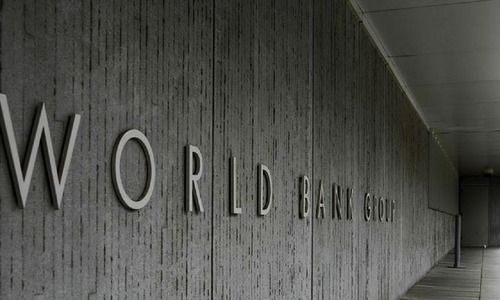ISLAMABAD: Pakistan and the World Bank on Tuesday signed five loan agreements of $787 million for development projects, majority of them for Karachi uplift.
The agreements were signed by Economic Affairs Division secretary Noor Ahmed, World Bank’s country director in Islamabad Patchamuthu Illangovan and the representatives of governments of Sindh and Khyber Pakhtunkhwa and the National Transmission and Dispatch Company Ltd. Minister for Economic Affairs Hammad Azhar witnessed the signing ceremony.
The World Bank will provide $652m for three development projects in Karachi to support urban mobility, urban management and service delivery, improve water and sewerage services, tourism and power sectors.
The first loan of $382m was inked for Karachi Mobility (Yellow Line) Project that is expected to improve mobility, accessibility and safety along the yellow line Bus Rapid Transit (BRT) corridor in Karachi. The project will help to develop urban road infrastructure (Yellow Corridor), rehabilitation or reconstruction of road infrastructure along the yellow corridor, development and operationalisation of a BRT system and capacity building.
The Yellow BRT corridor was recently approved by the federal government with revised cost estimates of Rs61.436 billion. The Sindh government had proposed the Karachi Urban Mobility Project (Yellow Line Bus Rapid Transit) worth Rs65.968bn but the federal government had rationalised its cost estimates down to Rs61.4bn.
Karachi to get $652m for three development projects
The corridor starts at Dawood Chowrangi in the east, runs through the Korangi industrial area, and ends at Numaish Chowrangi. It is one of five priority lines in the city’s transport plan and will benefit commuters along Surjani Town and Korangi industrial area, and will reduce travel time, road traffic fatalities, and reduce emissions.
Another World Bank loan worth $230m will finance Competitive and Livable City of Karachi Project. The project is targeted to improve the performance of Karachi Local Councils and agencies in urban management, financing and service delivery and to improve the business environment for development of the private sector. The project is expected to help address some of the challenges of urban management service delivery and business environment being faced by Karachi by selectively tackling critical bottlenecks.
The project will help improve performance and service delivery by local councils through performance-based grants for urban property tax system, incentivise private sector participation in service delivery, enhance ease of doing business, and improve solid waste management.
Another loan worth $40m was signed for Karachi Water and Sewerage Services Improvement project (Phase-1). The project aims to improve access to safe water services and to increase Karachi Water and Sewerage Board’s financial and operational performance. The project is conceived as the first in a proposed series of projects that forms a long-term programme to address the serious water, sanitation and hygiene service gaps in rapidly growing Karachi.
The Executive Committee of the National Economic Council had approved the project a few weeks ago at a cost of $105.21m (Rs16.71bn) to improve water resources and quality of sewerage system in Karachi.
The three projects have come following the findings of the ‘Karachi Transformative Strategy’ that estimates infrastructure needs of between $9-10bn in financing over a 10-year period to meet infrastructure and service delivery needs of the country’s largest city through urban transport, water supply and sanitation, and municipal solid waste.
Also, a $70m loan for Khyber Pakhtunkhwa Integrated Tourism Development Project was signed to improve tourism-enabling infrastructure, develop tourism assets, and strengthen management for sustainable tourism development in KP.
Likewise, an additional financing agreement worth $65m was signed for Central Asia South Asia Electricity Transmission and Trade Project (CASA-1000) Project. The objective of the ongoing project is to create the conditions for sustainable electricity trade of 1,300MW between Central Asian countries (Tajikistan and the Kyrgyz Republic) and South Asian countries — Pakistan (1,000MW) and Afghanistan (300MW).
Minister for Economic Affairs Hammad Azhar on the occasion said that the signing of five projects worth $787m was an expression of resolve of the World Bank to support the development agenda of the present government. He thanked the World Bank for extending its continuous support to the government in its efforts to achieve sustainable economic development in the country.
The World Bank country representative appreciated the reforms initiatives of the government and said the lending agency would extend possible support and facilitation to help put Pakistan’s economy back on track.
Published in Dawn, November 27th, 2019














































